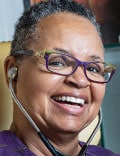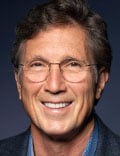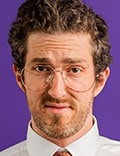
Lynette Charity, MD
When Lynette Charity, MD, was in her 40s, she found herself standing on a bridge, prepared to jump.
That’s not a metaphor. Real bridge. Real urge to jump.
At the time, she was working as an anesthesiologist and had started hearing voices in her head — not the funny kind. As she stood on the bridge, one of the voices rose above the rest and said, “Call your mama!” That voice jolted Charity out of her “fugue state.”
Oh my goodness, she thought, if I don’t call my mother before I kill myself, she’s going to kill me.
Today, Charity makes audiences laugh with that line, despite the anguish of the story. In addition to anesthesiology, she works as a keynote speaker and humorist, giving lighthearted presentations to medical students and fellow physicians.
“It’s nice to find the humor in the tragedy,” she says.
There’s no argument that medicine is serious business, but humor’s place in medicine has been debated for decades (Robin Williams made an entire movie out of the subject, Patch Adams.) Should physicians build authority through seriousness and clinical distance? Or can better, faster connections be made by bringing smiles — and even flat-out laughter — to patients?
Charity is one of a number of physicians who don’t just bring a sense of humor to the job; they’re also humorists and stand-up comedians outside the clinic. Many enjoy poking fun at the self-seriousness of the medical profession, whereas others keep their two identities separate. In both instances, physicians’ comedy has sometimes been criticized as “unprofessional” by fellow medical pros and authority figures.
These folks do it anyway — as a personal balm to prevent burnout, have some fun, and engage patients, colleagues, and audiences.
“There’s no question in my mind that levity has a place in medicine,” says Bill Miller, MD, an anesthesiologist who started his medical and standup careers back in the 1980s. His attitude was, if you can make people laugh, why wouldn’t you?
‘Doctors Shouldn’t Be Doing This’

Bill Miller, MD
During Miller’s first winter break from medical school, he returned to one of his regular Los Angeles haunts, The Comedy Store, the Sunset Strip club that launched Robin Williams and David Letterman. He waited in the wings, “scared to death,” with 5 minutes of material he’d prepared for the club’s Monday showcase night, which welcomed amateur comedians up on stage.
“People laughed,” Miller recalls. “And that was it: I was hooked.” Miller, who now lives and practices in the Chicago suburbs, has since performed at comedy clubs across the country and is known by his stage name, Dr Bill (see video for a sample of his work).
Years later, while Miller was working in the emergency department at a Los Angeles County hospital, a negative review of his stand-up ran on the front page of The Los Angeles Times‘ Metro section. The chair of his department called him in for a meeting. “What is this?” the chair asked Miller. “What are you doing?”
“When I first started, people [in medicine] looked at me like I wasn’t serious as a doctor,” Miller says, “and people in comedy looked at me like I wasn’t serious as a comedian.”
To some physicians, “professional” is synonymous with “serious.” Medical work is often solemn, with its demanding hours and recurrent matters of life or death. In that sense, medicine and comedy are opposing ends of the professional spectrum — which often leads to criticism of “the funny ones” from within the medical community.

Will Flanary, MD
Around the time of his high school graduation, Will Flanary, MD, was faced with the choice of whether to go to med school or pursue comedy full-time after finding some success at open mics. He jokes that he asked himself, “Do I pursue comedy as a career, or do I go the much easier route of becoming a doctor?”
Flanary chose the “easier route” and became an ophthalmologist — hence the name of his comedic alter ego, Dr. Glaucomflecken, after the term for a change in the lens of the eye after acute angle closure.
Flanary took it up a notch when, while bored at a medical research conference in 2016, he launched a Twitter account. Since then, his tweets and video skits lampooning various medical disciplines have gone viral on Twitter (@DrGlaucomflecken) as well as TikTok and YouTube. But his social media presence also offers an easy way for people to post critical comments.
“You’re going to get some people who aren’t happy with it, who feel like, ‘Wait, this is not supposed to be the persona of a doctor,'” Flanary says. “I’ve gotten some pushback because of that mindset. Medicine is a very unique field in that it is so serious all the time, so it can be difficult to step back and laugh at yourself.”
But Isn’t It the Best Medicine?
Charity argues that this seriousness is the very reason why a sense of humor is so important. “The reason why I started doing a little bit of public speaking is because of the issues of physician burnout, suicide, and depression,” she says. “I’m a member of that club.”
Growing up in the segregated South, Charity was told her possibilities in life were limited. When she was 2 years old, her sister was hit by a car and killed in front of her. Charity’s father and Charity herself experienced a deep sadness that she now recognizes as depression. Later, as a doctor, she experienced similar feelings, but didn’t seek help owing to the stigma of mental illness among physicians.
“For the longest time, I never took any antidepressant because I was afraid that someone would find out and I would lose my license,” she says.
Charity’s public speaking work began rather straight-faced. But after seeing that humor and storytelling were a lot more effective than a mountain of data and seriousness, she injected comedy into her presentations. These have included “Laughing Your Way Out of a Lawsuit” on an experience with malpractice and “I’ve Lost my Keys. Do I Have Dementia?” on anesthesia and elderly patients. Charity now takes an antidepressant, but she also credits her humor-driven work with improving her mental health.
Good for Doctors and Patients
So, what would comedian physicians say to those who still argue that bringing humor into the workplace is “unprofessional?”
“I would tell them, ‘That’s not a very professional attitude,'” Miller says. “My bedside manner does not have to be somber. I can make the patient laugh and feel comfortable. [Humor] breaks the ice and defervesces the stress.”
Research seems to agree. An analysis of recorded clinical encounters published in The Journal of the American Board of Family Medicine in 2018 found that the use of humor played “a role in the social connection between patients and physicians,” brought “warmth to the medical encounter,” and allowed “easier discussion of difficult topics.” A research review published in the Medical Science Educator in March 2023 also found that, when used positively, humor helps physicians manage emotions and facilitates camaraderie.
“We’re not just robots,” Flanary says of physicians. “[Humor] is good for being able to relate to the general public, which is something that’s been really difficult for physicians to do for a long time.”
To that end, Flanary embraces a golden rule of comedy: Make sure punchlines “punch up.” He uses his platform to skewer himself, institutions, and his fellow physicians, not his patients or anyone of lower social status.
“I think humor has always been a big part of medicine behind the scenes, because it’s a healthy coping mechanism,” Flanary says. “Everybody in healthcare needs an outlet. For a long time, that’s been in break rooms, telling jokes, making fun of things behind closed doors. But with social media now, all of the things that were already happening in med school and in residency — all the jokes and humor — are being brought into the public sphere.”
That’s what these comedian doctors have ultimately found: Humor can support professionalism rather than oppose it. In this era of rampant burnout in the medical field (as well as public vitriol toward physicians and science), there may be no better time to expand the ideal of professionalism to welcome the lighter side of a heavy vocation.
“I’ve met a number of physicians who say, ‘I was thinking about doing comedy. What do you think?'” Charity says. “I say, ‘Go for it!’ Your ability to write down the stresses in your life and get them out in any shape or form is better than holding them in and then potentially (in my case) dying by suicide. It’s not worth it. There is nothing wrong with a little levity.”
Source: Read Full Article





